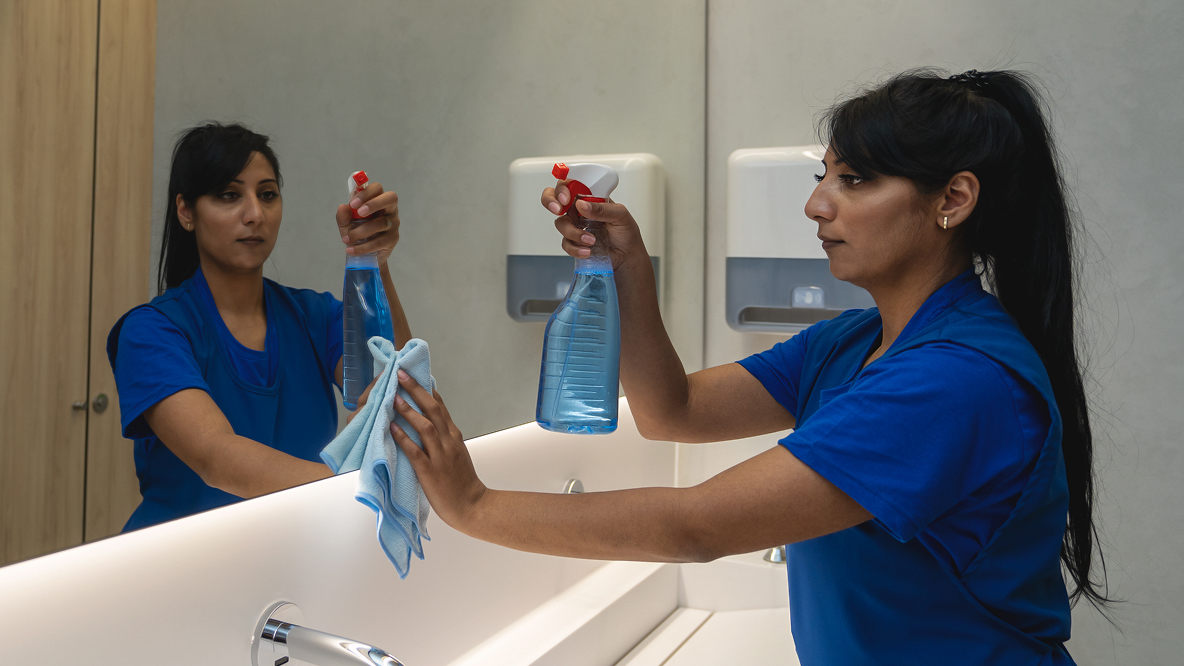Table of Contents
Aspire surveyed building service contractors nationwide to gather insights on their business expectations for 2024 and the sector’s goals for the future.
Download the 2024 Commercial Cleaning Insights white paper to gain business insight, identify trends, and compare your performance against other contractors.
Summary findings
The State of Commercial Cleaning
As an industry in expansion, commercial cleaning services are closely tied to macroeconomic conditions and overall disposable income levels. This means that the demand for contractors fluctuates along with the financial landscape—and that businesses must keep their fingers on the pulse of market conditions to stay ahead of the competition.
To analyze the current situation and shed light on industry trends, Aspire partnered with Thrive Analytics to survey 1,025 building service contractors nationwide, not solely limited to Aspire customers. Data collection was conducted online among commercial businesses with more than $1 million in sales revenue. They were all from cleaning-related businesses.
Key findings
Aspire's analysis reveals how commercial service contractors fared in 2023 and the industry’s goals for the upcoming year. Survey results indicate that:
The outlook for the commercial cleaning industry in 2024 is mixed, with a significant portion of businesses expressing a neutral stance (53%).
Commercial cleaning businesses have set their sights on customer focus and revenue growth as their top priorities for 2024. Increasing revenue is the primary goal for 63% of businesses, followed by improving cash flow (57%) and hiring or retaining employees (54%).
Customer retention is essential to contractors, as repeat business represents the most significant source of revenue (37%), and most work (55%) comes from recurring janitorial services.
With customer acquisition as an essential objective for 49% of survey respondents and word-of-mouth referrals representing 30% of contractor revenue, 35% of cleaning companies plan to implement sales and marketing strategies to reach their goals.
With ongoing supply chain issues and increasing costs across the board, business management software has become critical to commercial cleaning services. Most (62%) respondents have enjoyed efficiencies and enhanced capabilities while using business management software.
92% of contractors interviewed currently use software to run their business,
and 28% plan to further invest in technology this year.
Commercial Cleaning Industry Goals
Focused on customers and growing revenue, contractors identified their top business goals as:
Increasing revenue (63%).
Improving cash flow (57%).
Hiring or retaining employees (54%).
Tech adoption to reach goals
To achieve these goals, building service contractors have actively embraced technology adoption to help them increase revenue and boost cash flow while keeping employees motivated and attracting top talent.
Identified risks
There are several challenges and risks cleaning companies face in reaching their goals in 2024. The most significant risks identified by survey respondents include:
Staffing: 61%
Retaining customers: 56%
Potential economic recession: 43%
Commercial Cleaning Industry Trends
High software usage
Business management technology is considered an essential tool to help companies simplify operations and increase productivity.
All-in-one software offers companies a complete solution to run all aspects of their business, which can result in improved efficiency and increased revenue.
62% of larger commercial cleaning companies with $20M-$49M in annual revenue choose end-to-end business management solutions to run their operations—22% more than the industry average.
While 62% of businesses surveyed identified product features as the main reason for choosing their current business management software, 19% will likely consider switching providers in 2024.
Supply chain challenges
Although supply chain issues persist, the survey uncovered that lead times have improved over the past six months.
Currently, the most challenging materials for building service contractors to obtain are vehicles (63%) and equipment (54%).
Decreased lead times
The good news is that, in the experience of building service contractors, lead times have not increased for most contractors. 49% stated that lead times have stayed the same, and 46% noted a one-week or more decrease.
As businesses navigate these shortages, most commercial cleaning companies (28%) purchase directly from supply houses. Other popular purchase locations are vendors (26%) and online marketplaces (20%).
Rising costs
With inflation on the rise for commercial cleaning companies, software can offer cost-cutting solutions that streamline operations and may result in business savings.
Labor costs have gone up for the industry as a whole. An overwhelming majority (86%) of surveyed businesses plan to increase their employee salaries, and more than half (54%) will do so by 5% or more.
Digital transformation
Building service contractors see technology as a solution to become more efficient and modernize their business processes. A majority of respondents (70%) indicated that digital transformation is important to them.
When looking at emerging technologies, 46% of companies expect robotics to become a game changer over the next few years.
27% of the industry is also looking toward building information modeling (BIM) to help staff perform their work more efficiently.
Industry Benchmarks
Service areas
41% of survey respondents work in service areas beyond a 100-mile radius of their headquarters
19% are regional companies that operate in more than one state but are limited to one region
21% have nationwide teams and customers
Only 1% of respondents service customers outside of the country
Expanding your service area can help broaden your customer base, improve profit margins, and foster brand visibility. Using specialized business management software can help you execute this growth strategy, manage more properties, and maximize the potential benefits of expansion.
>> DOWNLOAD THE FULL EBOOK HERE
Methodology
To understand the state of commercial service contractors and their perceptions, Aspire partnered with Thrive Analytics to survey 1,025 building service contractors. This sample included respondents from a variety of trades, not solely Aspire customers, broken down as follows:
Note: This white paper is for informational purposes only and Aspire provides no assurances (express or implied) with respect to the accuracy of the survey data.
The survey was conducted on behalf of Aspire Software by Thrive Analytics, an independent third-party research provider and a leading digital marketing research firm.



![Landscaping Business Due Diligence: Complete Guide [2025] Landscaping Business Due Diligence: Complete Guide [2025]](http://images.ctfassets.net/3cnw7q4l5405/6FhiPCf8mCcAawEddWnUXm/69ff3b97b13c1f0ca6f6d956adc2dd07/Landscaping_business_due_diligence__complete__guide_-2025-.png)
![How to Hire a Bookkeeper for Landscapers: Full Guide [2026] How to Hire a Bookkeeper for Landscapers: Full Guide [2026]](http://images.ctfassets.net/3cnw7q4l5405/5AbVDtokUcXVBR3HYotDM8/dcafa256d702a0e2a4fa432e9de43fb7/How_to_hire_a_bookkeeper_for_landscapers.png)


